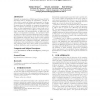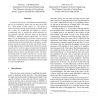148 search results - page 23 / 30 » Multi Agent Based Simulation: Beyond Social Simulation |
ATAL
2009
Springer
14 years 2 months ago
2009
Springer
Human interaction depends on several individual factors such as personality, social relations, age or gender. But also the society we live in influences our behaviour. Thus cultur...
WCNC
2008
IEEE
14 years 1 months ago
2008
IEEE
—With the rapid growth of WLAN capability for mobile devices such as laptops, handhelds, mobile phones and vehicles, we will witness WLANs with very large numbers of active nodes...
ATAL
2007
Springer
14 years 1 months ago
2007
Springer
Research on organization of Multi-Agent Systems (M.A.S.) has shown that by adapting its organization, a M.A.S. is better able to operate in dynamic environments. In this paper we ...
IADIS
2003
13 years 8 months ago
2003
Collaborative Filtering systems suggest items to a user because it is highly rated by some other user with similar tastes. Although these systems are achieving great success on we...
ICNP
2005
IEEE
14 years 1 months ago
2005
IEEE
In wireless networks, it is well understood what throughput can be achieved by nodes who can hear each other (i.e. nodes within a single cell)[1, 3]. The effects of nodes beyond t...


